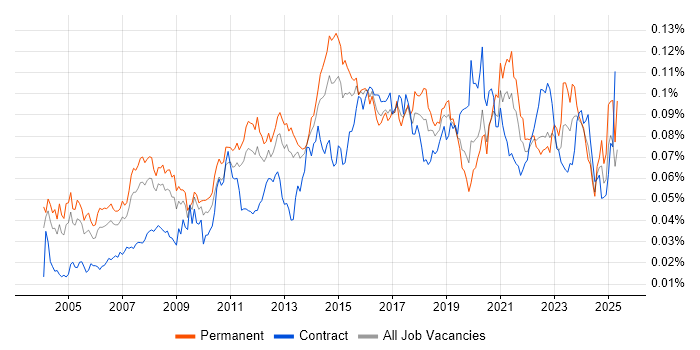ERP Analyst
UK > England
The median ERP Analyst salary in England is £45,000 per year, according to job vacancies posted during the 6 months leading to 29 May 2025.
The table below provides salary benchmarking and summary statistics, comparing them to the same period in the previous two years.
| 6 months to 29 May 2025 |
Same period 2024 | Same period 2023 | |
|---|---|---|---|
| Rank | 617 | 766 | 843 |
| Rank change year-on-year | +149 | +77 | +231 |
| Permanent jobs requiring an ERP Analyst | 42 | 69 | 67 |
| As % of all permanent jobs advertised in England | 0.087% | 0.078% | 0.077% |
| As % of the Job Titles category | 0.095% | 0.082% | 0.085% |
| Number of salaries quoted | 26 | 54 | 60 |
| 10th Percentile | £36,250 | £35,375 | £31,225 |
| 25th Percentile | £39,000 | £40,000 | £37,500 |
| Median annual salary (50th Percentile) | £45,000 | £42,750 | £45,000 |
| Median % change year-on-year | +5.26% | -5.00% | -10.00% |
| 75th Percentile | £58,938 | £50,625 | £57,813 |
| 90th Percentile | £60,625 | £59,325 | £66,500 |
| UK median annual salary | £45,000 | £43,000 | £45,000 |
| % change year-on-year | +4.65% | -4.44% | -5.26% |
All Permanent IT Job Vacancies
England
For comparison with the information above, the following table provides summary statistics for all permanent IT job vacancies in England. Most job vacancies include a discernible job title that can be normalized. As such, the figures in the second row provide an indication of the number of permanent jobs in our overall sample.
| Permanent vacancies in England with a recognized job title | 44,066 | 84,104 | 79,158 |
| % of permanent jobs with a recognized job title | 90.78% | 94.65% | 91.44% |
| Number of salaries quoted | 23,206 | 62,399 | 50,596 |
| 10th Percentile | £29,250 | £28,500 | £32,500 |
| 25th Percentile | £41,250 | £38,250 | £45,000 |
| Median annual salary (50th Percentile) | £56,000 | £52,500 | £60,800 |
| Median % change year-on-year | +6.67% | -13.65% | +1.33% |
| 75th Percentile | £75,000 | £71,250 | £81,250 |
| 90th Percentile | £97,500 | £90,000 | £100,000 |
| UK median annual salary | £55,000 | £52,500 | £60,000 |
| % change year-on-year | +4.76% | -12.50% | - |
ERP Analyst
Job Vacancy Trend in England
Job postings that featured ERP Analyst in the job title as a proportion of all IT jobs advertised in England.

ERP Analyst
Salary Trend in England
3-month moving average salary quoted in jobs citing ERP Analyst in England.
ERP Analyst
Salary Histogram in England
Salary distribution for jobs citing ERP Analyst in England over the 6 months to 29 May 2025.
ERP Analyst
Job Locations in England
The table below looks at the demand and provides a guide to the median salaries quoted in IT jobs citing ERP Analyst within the England region over the 6 months to 29 May 2025. The 'Rank Change' column provides an indication of the change in demand within each location based on the same 6 month period last year.
| Location | Rank Change on Same Period Last Year |
Matching Permanent IT Job Ads |
Median Salary Past 6 Months |
Median Salary % Change on Same Period Last Year |
Live Jobs |
|---|---|---|---|---|---|
| South East | +89 | 16 | £42,500 | - | 5 |
| North of England | +30 | 11 | £47,500 | +1.06% | |
| Midlands | +59 | 10 | £45,000 | +5.26% | |
| East Midlands | +38 | 8 | £42,500 | +21.43% | |
| North West | +3 | 8 | £37,500 | -28.57% | |
| East of England | +43 | 3 | £60,000 | +9.09% | |
| South West | +116 | 2 | £45,000 | -25.00% | 5 |
| West Midlands | +51 | 2 | £57,500 | +30.68% | |
| Yorkshire | +49 | 2 | £56,750 | +20.74% | |
| North East | +45 | 1 | £45,000 | +12.50% | |
| ERP Analyst UK |
|||||
ERP Analyst Skill Set
Top 30 Co-occurring Skills and Capabilities in England
For the 6 months to 29 May 2025, ERP Analyst job roles required the following skills and capabilities in order of popularity. The figures indicate the absolute number co-occurrences and as a proportion of all permanent job ads across the England region featuring ERP Analyst in the job title.
|
|
ERP Analyst Skill Set
Co-occurring Skills and Capabilities in England by Category
The follow tables expand on the table above by listing co-occurrences grouped by category. The same employment type, locality and period is covered with up to 20 co-occurrences shown in each of the following categories:
